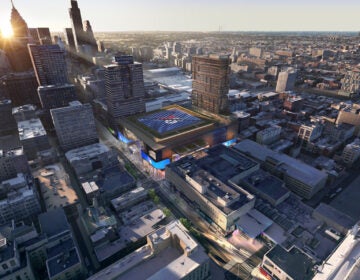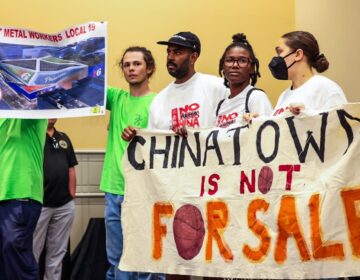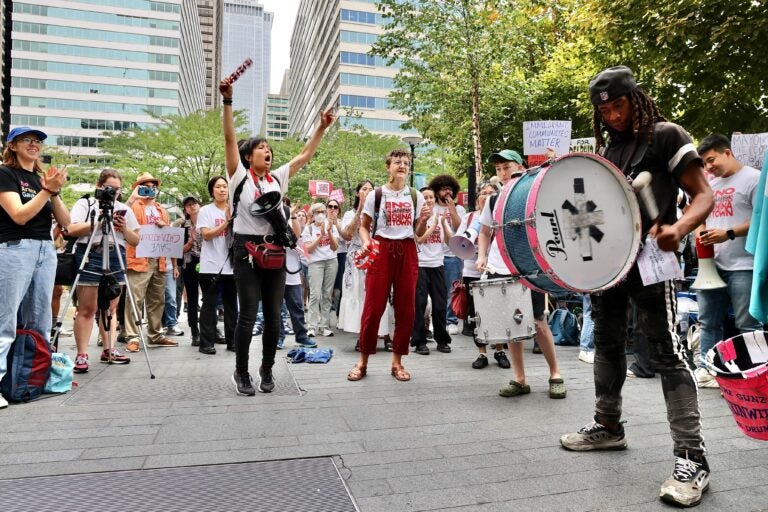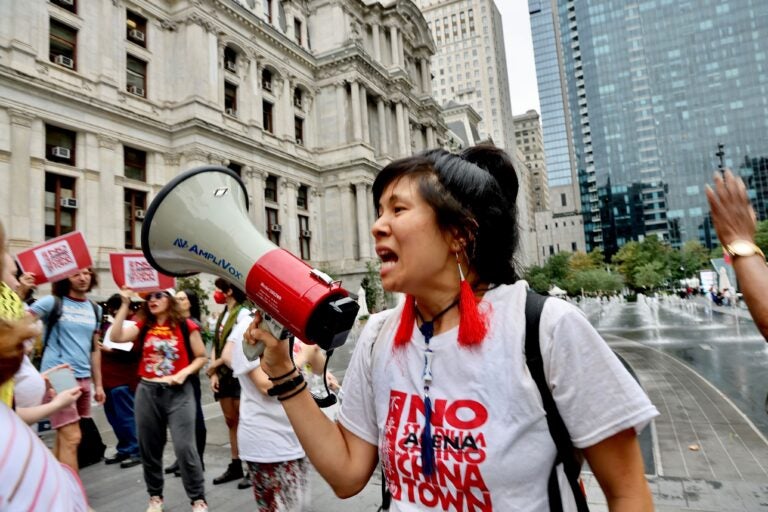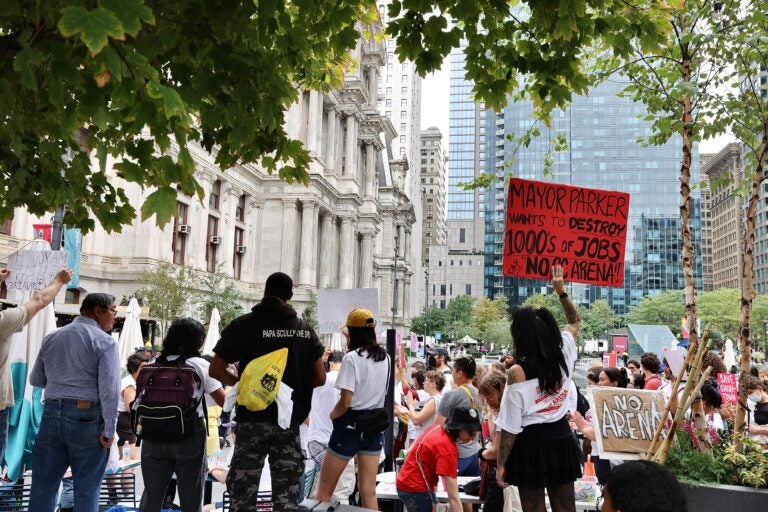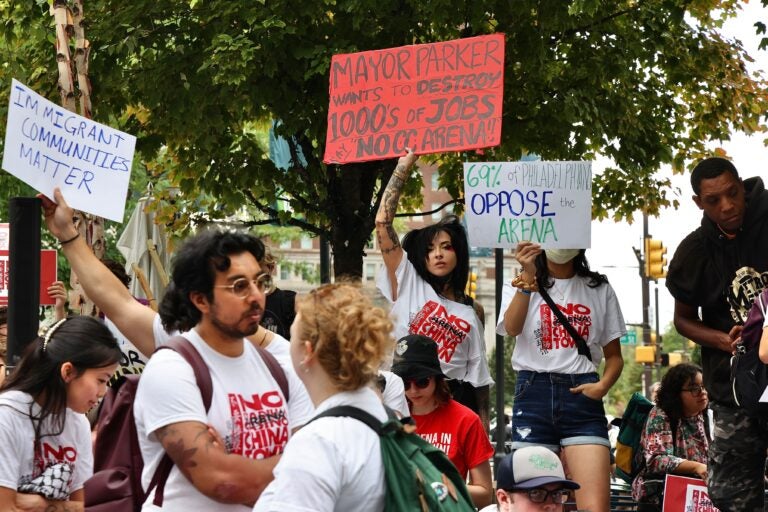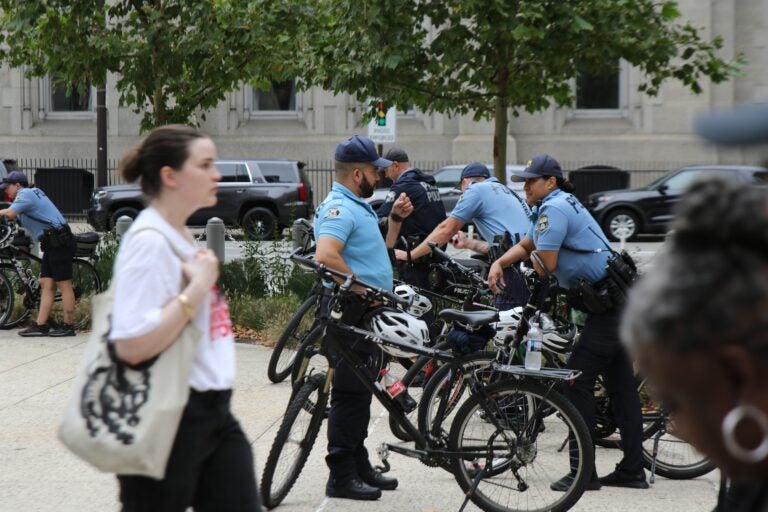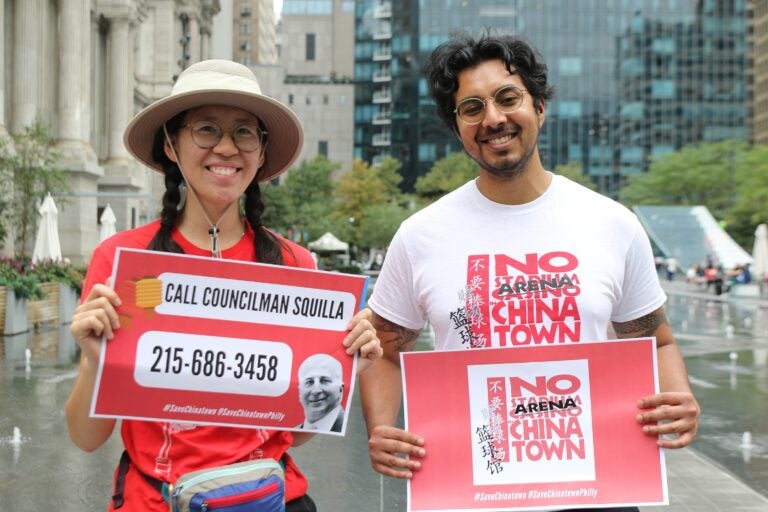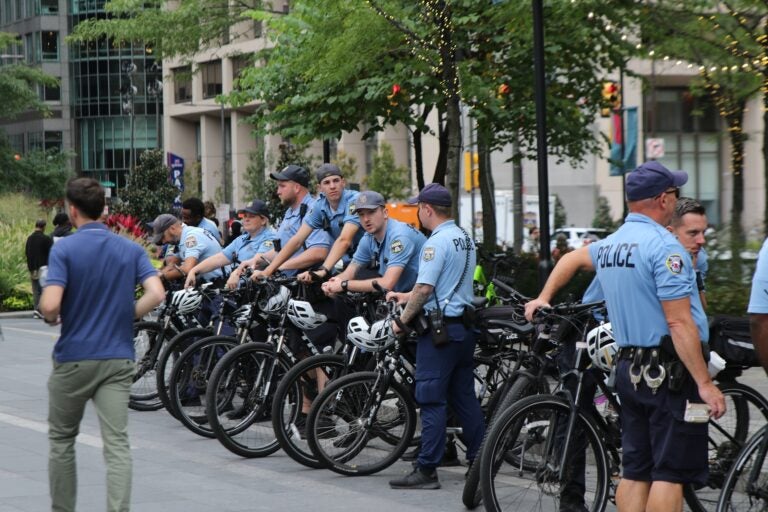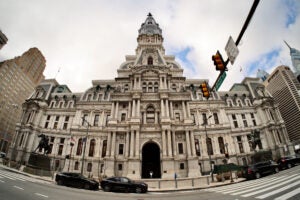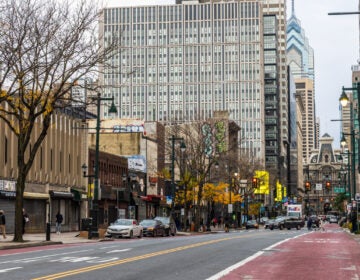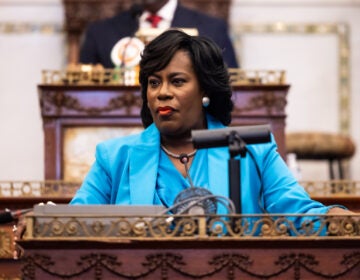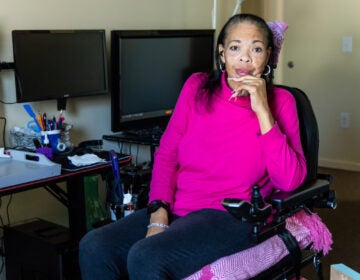Mayor Parker says agreement reached over 76ers arena in Center City
Mayor Cherelle Parker said she will present a legislative package to City Council for approval on a new 76ers arena to be developed in Center City.
Listen 5:58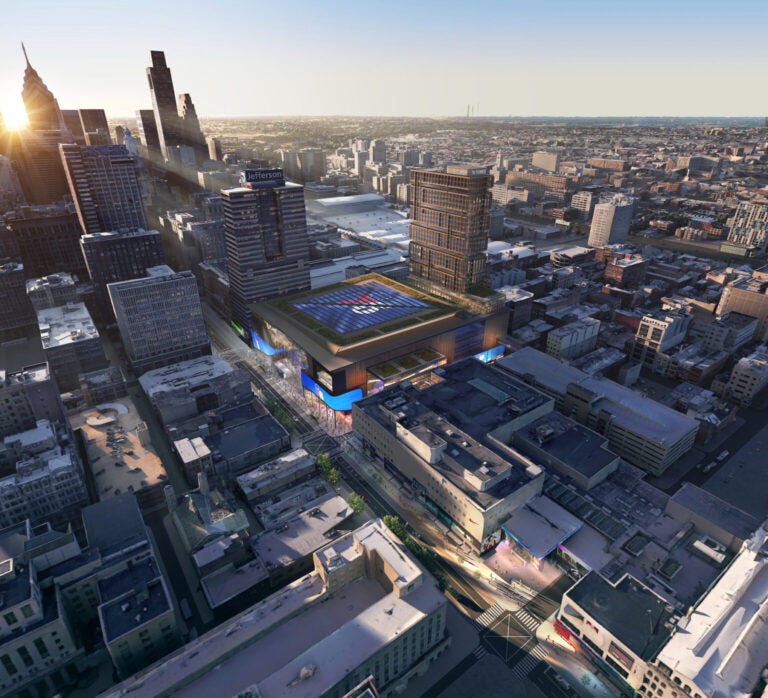
The 76ers are pitching a mixed-use development in Philadelphia's Market East neighborhood nearby Chinatown which would include a residential tower and retail shops. (Courtesy of the 76 DevCorp.)
Sixers arena: What you need to know
- The 76ers have proposed moving to a new $1.55 billion arena near Chinatown called “76 Place”
- The proposal has drawn swift condemnation, excitement, skepticism — and plenty of buzz
- Black Clergy of Philadelphia has endorsed the project, while a majority of Chinatown businesses and other community members have voiced their opposition
- Amid competing interests, the arena’s future remains uncertain
From Philly and the Pa. suburbs to South Jersey and Delaware, what would you like WHYY News to cover? Let us know!
Philadelphia Mayor Cherelle Parker is backing the Sixers’ proposal to build a new basketball arena in Center City near Chinatown.
“This is an historic agreement. It is the best financial deal ever entered into by a Philadelphia mayor for a local sports arena. And I wholeheartedly believe it is the right deal for the people of Philadelphia,” Parker said in a pre-recorded video posted to X, formerly known as Twitter, Wednesday.
The administration did not release the agreement Wednesday. Parker said a series of town hall meetings will be held around the city to give people “access to the facts that are contained in the agreement and the legislation as it moves through the City Council process.”
A Sixers spokesperson, in a statement, said the team is “grateful” to the Parker administration, and that it looks “forward to advancing to the next steps with City Council.”
The controversial decision jumpstarts the approvals process the team needs to go its way in order to start construction on the $1.55 billion development.
City Councilmember Mark Squilla, whose district includes the proposed site at 10th and Market Streets, has said he would introduce enabling legislation on behalf of the administration — if Parker supported the project.
He has vowed to share any legislation with the public at least 30 days before introduction, which he reaffirmed in a statement Wednesday.
“Now that the Mayor has made a decision on 76 Place, CM Squilla remains steadfast in his commitment to circulate the package of bills to all stakeholders for at least 30 days,” Squilla said. “During this time, we expect to consider all concerns and amend the legislation as needed. Council will follow their legislative process and insure there are safeguards in place for the community stakeholders if legislation is introduced.”
The team has said it needs City Council to authorize the development by the end of the year to open the arena in 2031, the year its lease expires at the Wells Fargo Center in South Philadelphia.
The Sixers say the arena will help revitalize the blocks east of City Hall, which have struggled to thrive for decades despite millions in investment.
Parker echoed that argument on Wednesday, saying the arena will generate millions in tax revenue and hundreds of jobs.
“It means an economic opportunity plan, quite frankly, the likes of which have never been seen in our city. And it represents the start of an unprecedented revival of Market East, Philadelphia’s very first commercial corridor, which we know can reign supreme once again,” said Parker.
The mayor’s decision is a major blow to opponents, who have called the arena an “existential threat” to Chinatown, which sits feet from the proposed site.
They argue the arena will increase traffic congestion and hurt small businesses in the process as customers take their dollars elsewhere to avoid the headache. Critics are also concerned the arena will raise property values and drive out longtime residents of the immigrant community.
Parker on Wednesday met privately with leaders of the Chinatown community.
John Chin, executive director of the Philadelphia Chinatown Development Corporation, said the mayor told him and others that she “heard their concerns” and that she “did her best” to negotiate a favorable community benefits agreement. That’s a legally binding document that spells out what amenities and mitigations a developer is required to provide in exchange for support for a real estate project.
The administration is expected to discuss the details of that agreement during a press conference Monday or Tuesday, Chin said.
In the video, released at the start of Wednesday’s closed-door meeting, Parker said she is committed to working with the community to support the neighborhood, saying she wants Chinatown’s “rich and vibrant community and proud history to not just survive but to thrive.”
Members of the Save Chinatown Coalition vowed to continue their fight to defeat the project.
“Mayor Parker still hasn’t met with Chinatown after all this time, yet feels she can have a stance on whether our community should live or die. This was never about one person, and this fight is far from over. We are going to fight this, and we are going to the mat. It’s on,” said longtime Chinatown activist Debbie Wei in a statement.
Protesters against the proposal gathered outside of city hall Wednesday afternoon and voiced their displeasure of Parker’s decision.
“The reason this shirt says no stadium and no casino with no arena on top of it is that Chinatown has had so much thrown at it,” said Mohan Seshadri, the executive director of the Asian Pacific Islanders Political Alliance (APIPA).
“We had the Vine Street Expressway, which cut our community in two…We had two casinos thrown at us. We had a federal prison thrown at us,” he continued. “We had the Phillies stadium in 2000 thrown at us… We sure as hell are going to fight this out, to stop this arena that’s going to threaten not just Chinatown, but the heart of our city, Jefferson [Hospital], Washington West, all of these neighborhoods around as well.”
Jenny Zhang, an organizer with APIPA, said that the majority of 76ers fans were content to have the team stay in South Philadelphia.
“Stay in South Philly,” she said. “We have a really great situation going down there with the stadium district and it’s something that most cities don’t have. Philadelphians see through this. They know these billionaire owners don’t actually care about Philadelphia.”
The news comes a week after Parker presided over a lively community meeting packed with opponents and supporters of the arena proposal. The mayor did not take a public stance during the meeting, saying “all of Philadelphia matters to me.”
During that meeting, the Philadelphia Building and Construction Trades Council — an influential consortium of more than 50 labor unions that endorsed Cherelle’s run for mayor early in her campaign — reaffirmed its support of the arena.
“Guess what? Investment attracts more investment. That $1.5 billion can quickly become $10 billion and we can make sure that Chinatown has the culture it deserves,” Ryan Boyer, the business manager of the consortium, said at the meeting.
In late August, the city released a group of impact studies designed to help officials weighing the value of building a downtown arena.
An economic analysis found the new Sixers arena would generate about $1.9 billion in additional economic activity during construction and its 30-year lifespan. The report said that would result in $390 million in net new tax revenue for the city, its school district and the state.
However, a community impact study found the arena’s impact on Market East to be “inconclusive.”
The same report concluded the arena “could potentially result in the loss of Chinatown’s core identity and regional significance.”
WHYY News reporters Cory Sharber, Tom MacDonald and Phil Davis contributed to this report.
 This story is a part of Every Voice, Every Vote, a collaborative project managed by The Lenfest Institute for Journalism. The William Penn Foundation provides lead support for Every Voice, Every Vote in 2024 and 2025 with additional funding from The Lenfest Institute for Journalism, Comcast NBC Universal, The John S. and James L. Knight Foundation, Henry L. Kimelman Family Foundation, Judy and Peter Leone, Arctos Foundation, Wyncote Foundation, 25th Century Foundation, and Dolfinger-McMahon Foundation.
This story is a part of Every Voice, Every Vote, a collaborative project managed by The Lenfest Institute for Journalism. The William Penn Foundation provides lead support for Every Voice, Every Vote in 2024 and 2025 with additional funding from The Lenfest Institute for Journalism, Comcast NBC Universal, The John S. and James L. Knight Foundation, Henry L. Kimelman Family Foundation, Judy and Peter Leone, Arctos Foundation, Wyncote Foundation, 25th Century Foundation, and Dolfinger-McMahon Foundation.
To learn more about the project and view a full list of supporters, visit www.everyvoice-everyvote.org. Editorial content is created independently of the project’s donors.

Get daily updates from WHYY News!
WHYY is your source for fact-based, in-depth journalism and information. As a nonprofit organization, we rely on financial support from readers like you. Please give today.




